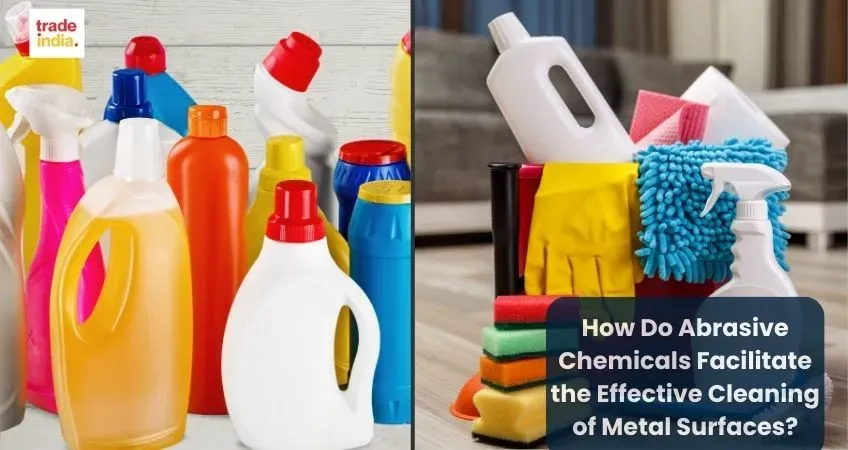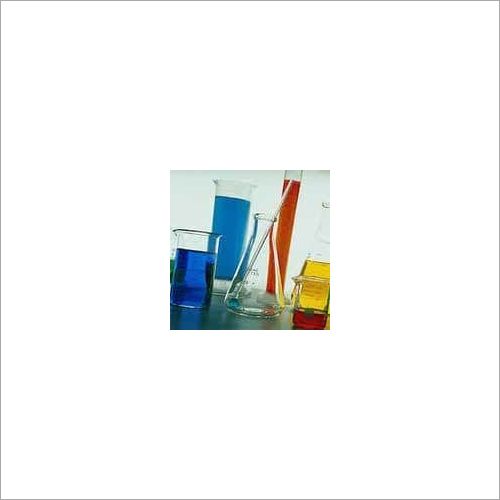How Do Abrasive Chemicals Facilitate the Effective Cleaning of Metal Surfaces?

Abrasive chemicals are highly effective substances specially formulated for cleaning metal surfaces and removing contaminants, including rust, dirt, paint, and grime. These chemicals forcefully break down and dislodge the stubborn residue on the surfaces, making them cleaner and smoother. Such effectiveness and efficiency of abrasive chemicals make them indispensable across industries like automotive, chemical, manufacturing, and maintenance. Only after efficient abrasive blasting of metal does it become eligible for further processing to manufacture high-quality and durable products.
Understanding Abrasive Chemicals
Abrasive chemicals are specialized chemicals facilitating the cleaning and polishing of metal surfaces. These substances are formulated to remove contaminants on the surfaces solely through chemical reactions. Developed strong, these chemicals work by breaking down and dislodging the residue including dirt, grime, rust, and paint, infused hard on the surface. After this process of abrasive blasting, the metal is then sent for further processing.
Major Types of Abrasive Chemicals
- Acids
Three major types of acids are used as abrasive chemicals for cleaning metal surfaces such as hydrochloric acid, sulfuric acid, and phosphorus acid. These chemicals effectively remove the contaminants from the surfaces without much effort.
- Alkaline Cleaners
Sodium hydroxide and potassium hydroxide are the two alkaline chemicals used for the efficient cleaning and polishing of metal surfaces. Sodium hydroxide effectively decreases and cleans the metal, whereas potassium hydroxide helps remove rust for further processing and painting of the metal.
- Solvents
Acetone and Toluene are the two solvents used across various industries for abrasive cleaning of various surfaces including metals. These chemicals conveniently remove oil, grease, and other types of contaminants and clear the rust off of the surface for further processing.
Applications of Abrasive Chemicals Across Various Industries
Automotive Industry
- Cleaning Engine Parts: Removal of grease, oil, and carbon deposits from engine components.
- Surface Preparation: Ensuring a clean surface for painting and coating applications.
Manufacturing
- Equipment Maintenance: Regular cleaning of manufacturing equipment to prevent the buildup of contaminants and ensure smooth operation.
- Metal Fabrication: Preparing metal surfaces for welding, coating, or assembly.
Construction
- Rust Removal: Eliminating rust from construction tools and equipment to prolong their lifespan.
- Surface Preparation: Cleaning metal structures before painting or coating to ensure adhesion and longevity.
Marine Industry
- Ship Maintenance: Cleaning hulls and other metal components to remove barnacles, algae, and rust.
- Preparation for Coating: Ensuring clean surfaces for anti-corrosion coatings.
Aerospace Industry:
- Component Cleaning: Removing contaminants from aerospace components to maintain performance and safety standards.
- Surface Treatment: Preparing metal surfaces like iron sheets, for special coatings that enhance durability and resistance.
Oil and Gas Industry
- Pipeline Maintenance: Cleaning pipelines and metal structures to prevent corrosion and ensure efficient operation.
- Equipment Cleaning: Removing residues from drilling and extraction equipment to maintain functionality.
How Abrasive Cleaning Works?
Abrasive Cleaning is an essential process that works by effectively removing contaminants from the surfaces through chemical reactions and mechanical actions. Here’s the detailed information:
Chemical Reactions
The process starts with polishing the metal surface with abrasive chemicals, starting a chemical reaction that breaks down the contaminants into fine particles that can be removed easily. These chemicals involve acids, alkaline cleaners, and solvents of various types.
Mechanical Action
Mechanical action involves manually dislodging the contaminants from the surface of the metals. The physical force can be applied through abrasive powders and pastes, brushes, pads, and blasting techniques. These tools contain fine particles of materials like silica sand or aluminum oxide which scrub off the contaminants from the surface. With all these tools, impact timing and friction play an essential role in cleaning metals.
Combined Chemical and Mechanical Cleaning
A way more effective than others is combining both chemical and mechanical actions to achieve effective abrasive blasting. So, if an acidic solution is applied to the metal surface it may effectively break down the rust or other contaminants, however, without physical action, it cannot be scrubbed off the surface for effective cleaning.
Major Benefits of Abrasive Chemicals
Enhanced Cleaning Efficiency
Abrasive chemicals provide superior cleaning power by breaking down tough contaminants such as rust, paint, grease, and grime. Their chemical action helps in loosening and dissolving these substances, ensuring thorough and efficient cleaning.
Effective Rust and Scale Removal
One of the primary applications of abrasive chemicals is the removal of rust and scale from metal surfaces. Acids like hydrochloric and phosphoric acid react with rust, converting it into soluble compounds that can be easily washed away, restoring the metal’s original appearance.
Improved Surface Preparation
Abrasive chemicals are essential for preparing metal surfaces for further processing, such as painting, coating, or welding. They ensure that the surface is clean and free of contaminants, which is crucial for achieving strong adhesion and high-quality finishes.
Time and Labor Savings
Using abrasive chemicals can significantly reduce the time and labor required for cleaning and surface preparation. Their powerful action minimizes the need for extensive manual scrubbing, allowing for quicker and more efficient cleaning processes.
Versatility
Abrasive chemicals are versatile and can be used on a wide range of materials and surfaces. They are effective in cleaning metals, ceramics, and even some types of plastics, making them suitable for various industrial and maintenance applications.
Precision Cleaning
Abrasive chemicals can be applied precisely to targeted areas, allowing for controlled and selective cleaning. This is particularly beneficial in situations where only specific parts of a surface need to be cleaned without affecting the surrounding areas.
Cost-Effective
While the initial cost of abrasive chemicals may vary, their efficiency and effectiveness can lead to overall cost savings. Reduced labor costs, faster cleaning times, and improved surface quality contribute to a more economical cleaning process.
Environmental Benefits
Many modern abrasive chemicals are formulated to be environmentally friendly, reducing their impact on the environment. Proper use and disposal of these chemicals help in maintaining environmental safety standards.
Consistency and Reliability
Abrasive chemicals provide consistent and reliable cleaning results. Their predictable action ensures that each cleaning process meets the required standards, which is critical in industries where precision and quality are paramount.
Extended Equipment Lifespan
Regular cleaning with abrasive chemicals helps in maintaining equipment and metal components, preventing the buildup of contaminants that can cause wear and corrosion. This maintenance extends the lifespan of machinery and tools, reducing the need for frequent replacements.
Difference Between Abrasive and Non-Abrasive Chemicals
Abrasive Chemicals
- Composition: Contain particles such as silica, aluminum oxide, or pumice.
- Action: Clean through mechanical scrubbing or scouring.
- Effectiveness: Highly effective for removing tough residues like rust, paint, and grime.
- Applications: Used in industrial settings, automotive maintenance, and metal fabrication.
- Surface Impact: This can cause scratches or wear on delicate surfaces.
- Ideal For: Hard surfaces such as metal, stone, and certain plastics.
Non-Abrasive Chemicals
- Composition: Include acids, alkalis, solvents, and detergents.
- Action: Clean through chemical reactions without physical scrubbing.
- Effectiveness: Ideal for dissolving or loosening contaminants without damaging surfaces.
- Applications: Used in household cleaning, healthcare settings, and industries requiring surface preservation.
- Surface Impact: Gentle on surfaces, preserving their integrity.
- Ideal For: Delicate surfaces such as glass, soft metals, painted surfaces, and electronics.
Related Blog:


